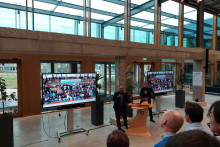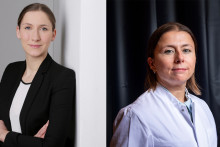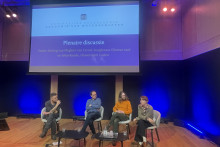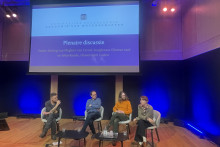Is higher education in English a blessing or a curse? Both supporters and adversaries are stirring, there is even the threat of a lawsuit by the Beter Onderwijs Nederland action committee against the State. Yesterday, the Royal Netherlands Academy of Arts and Sciences (KNAW) published a long-awaited ‘study’ on this subject.
The study, in a nutshell, concludes the following: have programme directors properly substantiate the choice of education language. This means doing away with ambitions such as ‘all master programmes in English’ or ‘a certain percentage of all education programmes should be given in the English language.’ Moreover, this is in line with the recommendation offered by the UT University Council two years ago.
In addition, if education programmes are offered in English, they should take extra care to ensure the quality does not suffer, says Utrecht Professor of Law Janneke Gerards, President of the Royal Netherlands Academy of Arts and Sciences committee that wrote the report.
Are too many education programmes rushing to choose English?
‘There is certainly something to be said for English in higher education, but we mostly say that language choice is a matter for each individual programme to decide. And if you do select the English language, you should do it to the best of your abilities.’
Should all teachers attend mandatory training courses?
‘No, we do not want to make new roadblocks that everyone will have to navigate around. You have to consider the teachers’ needs. Are they having difficulty grading papers written in English? Or does most of the trouble arise from not finding the right words immediately while speaking English? Once you have identified the problem, you can help teachers with coaching or a training course.’
You teach international students yourself. Have you had personal coaching?
‘No, but I am sure I would benefit from it. In that light, it is also a recommendation to myself, of course.’
Critics say that you will never be able to teach in English as well as you could in Dutch.
‘This cannot be generally established. It is certainly connected, but some people are just really good teachers, resulting in students not really minding if their English is short of perfect.’
How, then, should an education programme make that choice?
‘You have to consider what a student ultimately needs on the labour market, which differs from student to student: some will end up working in academia, others in the international business community, yet others in a Dutch-language environment. Therefore, there are different ways to choose English. Some will have to be able to write well in English, for others it is enough to be able to effortlessly read the language.’
The report also states that students who attend English-language education programmes, both foreign and Dutch, should still learn Dutch.
‘This is very important for foreign students if we want them to stay here and work: they will have to be able to understand their colleagues. And if Dutch students enter the Dutch labour market, they will have to be able to write a recommendation or speak to a client, for example.’
Is education improving thanks to foreign students?
‘It changes education. If I teach in English, I cannot use Dutch jurisprudence as an example. Moreover, students from other countries could offer entirely new insights into the subject at hand. A Hungarian student who sees an ‘illiberal democracy’ rise in his home country, has a different view of international law than a Dutch student will.’
The report also states that universities of applied sciences are sometimes more advanced in the quality care of their English-language programmes than universities. How is this possible?
‘They have a different focus, they prepare their students for professional practice. You will find that some universities of applied sciences have come quite a way with individual coaching for their teachers. They also often involve a language didactician in the development of new, English-language education programmes. These truly are best practices that universities can benefit from. However, universities of applied sciences could also take a leaf out the universities’ book with regard to their skill labs. They should really talk to each other.’
Your committee has adopted a fairly practical view, but an ideological discussion about open borders and migration simmers in the background.
‘We have purposefully avoided that discussion. We mostly considered which arguments are present in this debate and the effects English-language education might have.’
Were you walking on eggshells?
‘Of course, we have carefully read through everything written about the subject in the media. We may have squashed some eggshells. We will see in the days to come.’








